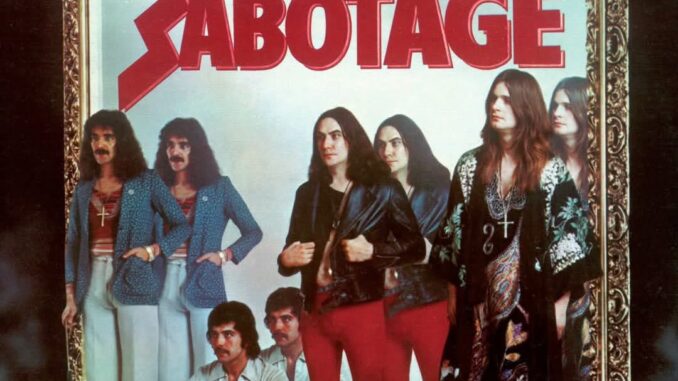
Sabotage was released 50 years ago. Indeed one of the best albums of Black Sabbath.According to Ozzy, “took about four thousand years to record!”…….Read more
50 Years of Sabotage: Celebrating One of Black Sabbath’s Finest Albums
Paraphrased News Report – 800 words
Half a century ago, Black Sabbath released one of their most powerful and underrated albums—Sabotage. On this 50th anniversary, fans and music critics alike are revisiting the 1975 masterpiece, recognizing it as a defining moment in the band’s history and one of their most complex and emotionally charged works.
Released on July 28, 1975, Sabotage was the sixth studio album from the pioneers of heavy metal. Coming off the heels of Sabbath Bloody Sabbath, which had pushed the band into more experimental territory, Sabotage marked a return to their heavier roots while retaining the maturity and intricacy they had developed over the years. Featuring tracks like “Hole in the Sky,” “Symptom of the Universe,” “Megalomania,” and “The Writ,” the album remains a fan favorite for its raw power, layered production, and deeply personal lyrics.
According to Ozzy Osbourne, recording Sabotage was no easy task. “It took about four thousand years to record!” he once joked. The remark, while humorous, speaks to the real difficulties the band faced during that period. Lawsuits with former managers had left them disillusioned and distracted, and those tensions bled into the music. The album’s title, Sabotage, was a reflection of how the band felt—under attack, undermined, and fighting to keep their creative control.
Despite the chaos behind the scenes, the result was one of Sabbath’s most musically adventurous and lyrically aggressive records. Guitarist Tony Iommi pushed the band’s sound into bold new territory, blending brutal riffs with complex arrangements. Bill Ward’s drumming was thunderous and intricate, while Geezer Butler’s bass provided the dark, driving force fans had come to expect. Ozzy’s vocals, meanwhile, were at their most desperate and unfiltered—screaming through songs filled with rage, paranoia, and defiance One of the most iconic songs from the album, “Symptom of the Universe,” is widely regarded as a precursor to thrash metal. Its aggressive guitar riff, frantic pace, and unrelenting energy inspired countless bands that would follow, from Metallica to Slayer. The song is often cited as a blueprint for the next generation of metal, making it one of Sabbath’s most influential tracks.
Another standout is “Megalomania,” a nearly 10-minute epic that blends haunting balladry with explosive rock sections. The song’s shifts in tempo and tone capture the psychological turmoil the band was experiencing. Lyrically, it dives into themes of isolation, madness, and betrayal—feelings that were very real to the band members at the time.
“The Writ,” which closes the album, is perhaps the most personal song Ozzy Osbourne ever recorded with Sabbath. Written largely by him, the lyrics are a direct attack on the legal battles the band was going through. “Are you Satan, are you man?” he sneers, with genuine venom. It’s an unfiltered cry from an artist who felt cornered and used.
Despite the brilliance of the album, Sabotage often gets overlooked in favor of more commercially successful records like Paranoid or Master of Reality. But for many die-hard fans and musicians, Sabotage stands as the band’s most complete statement—fusing their signature doom-laden sound with a new level of sophistication and emotional intensity.
Over the years, the album has gained greater recognition. Artists such as Dave Grohl, James Hetfield, and Corey Taylor have all cited Sabotage as one of their favorite Sabbath albums. Its legacy continues to grow, not just for its groundbreaking music but also for what it represented: a band under siege, but still refusing to back down.
To mark the 50th anniversary, fans have taken to social media to share memories of the album—first listens, concert footage, vintage vinyl copies, and fan art. Remastered editions and deluxe reissues have also been released in recent years, bringing fresh attention to the album’s importance in the Sabbath catalog.
Looking back, it’s clear that Sabotage was a turning point for Black Sabbath. It captured a moment when the band was on the edge—creatively, emotionally, and legally—and turned that turmoil into some of the most electrifying music of their career. Rather than fold under pressure, they channeled their frustration into an album that still punches just as hard today.
For Ozzy, Tony, Geezer, and Bill, Sabotage was more than just another album—it was a battle cry. A declaration that, no matter the obstacles, Black Sabbath would not be silenced.
Now, 50 years later, we can say with certainty:
Sabotage wasn’t just survival.
It was triumph.
And it remains one of heavy metal’s greatest achievements.
Leave a Reply